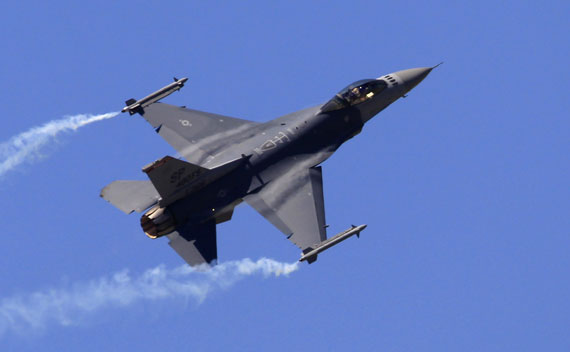A Primer on Air Power
More on:

The military intervention into Libya’s civil war has entered its 110th day without a clear end in sight. Despite the possibility of a bloody, protracted conflict, the intervening powers are steadfast in their insistence on the principles of no “boots on the ground,” and no supplying lethal aid to either side (though as I’ve noted, NATO has never enforced the arms embargo, and the French now openly violate it). Having taken ground troops off the table from the beginning, NATO and the small Arab League contingent pursued an airpower-only strategy to protect civilians and provide close air support to rebels on the ground.
As I wrote in a longer piece for Foreign Affairs online, many intervention proponents’ faith in airpower is based on myths about its use in the recent past. To understand why airpower has not achieved its intended military or political objectives in Libya, and why it will likely fail to meet similarly unrealistic future expectations, I recommend the following dozen books and six articles, excluding my own book on the subject.
BOOKS
Thomas Schelling, Arms and Influence (New Haven, CT: Yale University Press, 1966).
Alexander George, David Hall, and William Simons, The Limits of Coercive Diplomacy: Laos, Cuba, Vietnam (Boston, MA: Little, Brown, 1971).
Robert Art and Patrick Cronin (eds.), The United States and Coercive Diplomacy (Washington, DC: United States Institute of Peace Press, 2003).
Daniel Byman and Matthew Waxman, The Dynamics of Coercion: American Foreign Policy and the Limits of Military Might (Cambridge, UK: Cambridge University Press, 2002).
Robert Pape, Bombing to Win: Air Power and Coercion in War (Ithaca, NY: Cornell University Press, 1996).
Tami Davis Biddle, Rhetoric and Reality in Air Warfare: The Evolution of British and American Ideas about Strategic Bombing, 1914-1945 (Princeton, NJ: Princeton University Press, 2004).
Gian Gentile, How Effective is Strategic Bombing?: Lessons Learned From World War II to Kosovo (New York, NY: New York University Press, 2000).
- Mark Clodfelter, The Limits of Air Power: The American Bombing of North Vietnam (New York, NY: Free Press, 1989).
- Mark Clodfelter, Beneficial Bombing: The Progressive Foundations of American Air Power, 1917-1945 (Lincoln, NE: University of Nebraska Press, 2010).
Jacob Van Staaveren, Gradual Failure: The Air War Over North Vietnam, 1965-1966 (Washington, DC: United States Air Force, 2002).
Michael Knights, Cradle of Conflict: Iraq and the Birth of Modern U.S. Military Power (Annapolis, MD: Naval Institute Press, 2005).
Benjamin Lambeth: NATO’s Airwar for Kosovo: A Strategic and Operational Assessment (Washington, DC: Rand Corporation, 2001).
ARTICLES
Elliot Cohen, “The Mystique of U.S. Air Power,” Foreign Affairs, January-February 1994.
Daryl G. Press, “The Myth of Air Power in the Persian Gulf War and the Future of Warfare,” International Security, Vol. 26, no. 2 (Fall 2001).
International Security Kosovo airpower series. Daniel A. Byman and Matthew C. Waxman, "Kosovo and the Great Air Power Debate," Vol. 24, no. 4 (Spring 2000)” Andrew Stigler, “A Clear Victory for Air Power: NATO’s Empty Threat to Invade Kosovo,” Vol. 27, no. 3 (Winter 2002-3); Daniel Lake, “The Limits of Coercive Airpower: NATO’s “Victory” in Kosovo Reconsidered,” Vol. 34, no. 1 (Summer 2009).
Benjamin F. Jones and Benjamin A. Olken, “Hit or Miss?: The Effect of Assassinations on Institutions and War,” National Bureau of Economic Research, May 2007.
Jenna Jordan, “When Heads Roll: Assessing the Effectiveness of Leadership Decapitation,” Security Studies, Vol. 18 (2009).
Phil Gordon, “Air Power Won’t do It,” Washington Post, July 25, 2006.
(3PA tip: Note that the author currently serves as the Assistant Secretary of State for European Affairs, a job that entails rallying and coordinating European military support for NATO’s intervention in Libya. In this article, he warned of “the history of perennial overoptimism about air power,” “the wildly misplaced optimism about the effects of the use of force in Iraq,” and the mistaken theory that air power could “so impress the region’s populations (and frighten its dictators).” He concluded: “Invasions or airstrikes with the purpose of installing stable, pro-Western democracies would not seem a great bet in light of recent experience.”)
More on:
 Online Store
Online Store
